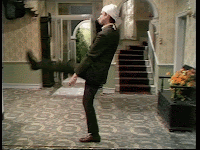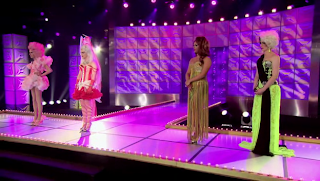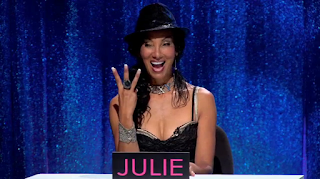“So, Nick, as I was saying…”
It was a sunny Sunday of August. I was filling the ears of this lad from Huddersfield, who’d rescued me from a lonely afternoon in Leeds by kindly inviting me to go to Wakefield Pride.
 |
| Wakefield Pride - 11th of August |
“Yes…” answered Nick, who patiently listened to my considerations on spirituality and success.
“…this idea is present in the words of many songs.”
I continued explaining such ideas to Nick whilst we sat on a bench, having a break from the noise and gaiety of Wakefield Pride.
 |
| Wake Me Up by DJ Avicii - Lyric Video |
When we returned to the event, they started playing the number one UK hit of the Summer: Wake Me Up.
“Listen, this is one of the songs I told you about.” I said all excited.
Nick perhaps didn't get the association straight away. Worse yet, perhaps he found I was going nuts to see any association between Wake and the idea of spirituality and success.
I
couldn't blame him. I myself consider the words in Wake a bit strange; it’s not really easy to
put the meaning of the words together.
The strangeness one may feel when first trying to understand the words of Wake is probably the same feeling I had when I first saw the O2 billboard in London.
You don't really get what Be More Dog means until you see
the O2 ad on tv.
The tv ad
shows an aloof and indifferent cat that decides to act as a dog -
i.e. be more (like a) dog.
Thus, by watching the official video of Wake we can
start making more sense of the words. So, considering the video, here I share
my impression of the meaning of the words in Wake.
Feel my way
through the darkness.
Guided by a beatin heart.
I can't tell how the journey will end.
By I know where to start.
So, wake me up when
it's all over.
When I'm wiser and
I'm older.
As the chorus starts, the stunning lass is shown walking alongside her sister in what seems to be a rural traditional community.
The people who they come across in the street are apparently cold and hostile to them. The video depicts a clash between the lasses, who dress up a trendy fashion, and the people, who dress in more traditional clothing.
Such depiction highlights the meaning of previous lines.
They tell me I'm too young to understand.
They say I'm caught up in a dream.
Life will pass me by if I don't open up my eyes.
So, that's fine by me.
The image also highlights
the irony of the chorus, as the trendy lass seems to assert herself in the face
of others. She is shown to be out of place in the community.
The video
depiction of a clash between the lass v. community does match the
song's initial words of admonishment - They say I'm too young /
caught up in a dream / life will pass me by. The other half of the video,
however, match the lines of Wake in a more abstract level.

The trendy lass mounts a horse, leaves the small community behind, gallops through a field, and reaches a big city.
Then, she takes a shine to a lady even trendier than her, and follows her along other young ones to a gig by Avicii and Aloe Blacc.
The video images are symbolic of the song's idea of freedom -
I tried carrying the weight of the world. But I only have 2 hands.
Hope I get a chance to travel the world. I don't have any plans.
- and the song's idea of adventure and playfulness.
Life is a game made for everyone. And love is the prize.
The coda shows the lass galloping back to the
community,
waking up her little sister, and cheerfully telling
her:
"Get up. Pack your things. [We're going] somewhere we belong."
Then, they hit the road.
The idea of finding one's true self seems to be encapsulated by this image - as expressed in Wake.
All this time I was finding myself.
And I didn't know I was lost.
The video
certainly conveys the idea of breaking free from traditional values, of leaving
a life of slumber behind, of pursuing to experience the vigour of youth to its
full potential. Possibly, to some,
the video still doesn't clarify what the words of Wake Me Up has
to do with the idea of spirituality and success.
Here are some final considerations.
Nothing says spirituality more than a reference from the Bible.
And it's easy to find some references about waking up/
being awake in the books of the Bible.
And it's easy to find some references about waking up/
being awake in the books of the Bible.
For you are all children of light, (...) So then let us not sleep, (...) but let us keep awake... Thessalonians 5.5-6.
For the hour has come for you to wake from sleep, for salvation is nearer... Romans 13-11.
Behold! I tell you a mystery. We shall not all sleep. (...) Death is swallowed up in victory. Corinthians 15.51/54.
Awake, O sleeper, rise from the dead, and Christ will shine on you. Ephesians 5.14.

Sleep in the Bible is a metaphor for death. It isn't too
far-fetched, I suppose, to see that the lass in the video is depicted as
somewhat being buried alive in a dead end of the world - a place offering her
no prospect of progress. The lines of Wake mention admonishment against a dream, a chance to travel the world - metaphors to departing from one's
current reality and place of birth. The lines of Wake also reveal a disdain
against such admonitions. Well
that's fine by me. Such disdain implies desire to wake from t' slumber
of a static life.
And what about success?
At the
end of the video, the lass decides to leave the community and pursue happiness
by going to a place where she and her sister belong. The image of the girls
hitting the road couldn't be more symbolic of the human exodus towards a
promised land. Is it too much to parallel this to pursuing
success?
Now, what's is undeniable is that Avicii is enjoying a great success
as Wake Me Up was created to shine.
Wake reached
number 1 in t' UK, Ireland, USA, n' many countries of Europe.
I heard on radio Aire Wake is considered so far t' song of 2013.
I heard on radio Aire Wake is considered so far t' song of 2013.
Is there a special reason to explain the great success
of Wake?
Does it have anything to do with some spiritual
principle?
I do affirm that Wake contains words that transmit a strong message about spirituality and success and that Wake subtly speaks its message to the people who are living the dawn of an awakening era.
I, particularly, can trace the choice of some words
and lines in Wake back
to modern American texts on the philosophy of
personal success,
i.e., self-improvement, self-fulfilment, and
getting rich.
That's how some odd choices of words and lines in Wake, I suppose, gain
further meaning and reveal more clearly its relation to spirituality and
success.
If you want to check the origins of such
choices, please,
click the link below.
A-Wake! Part Two

















































